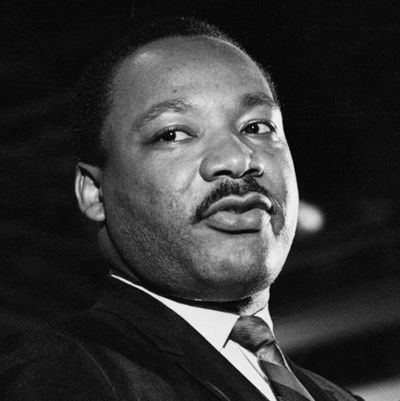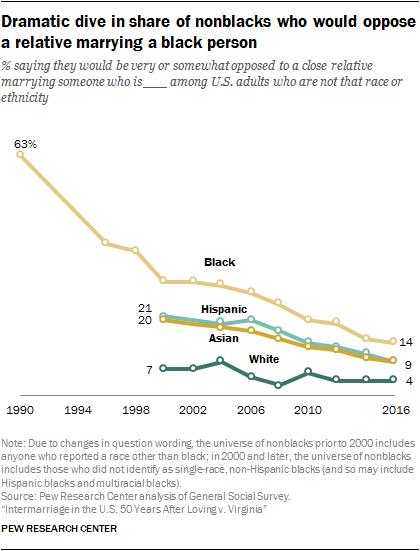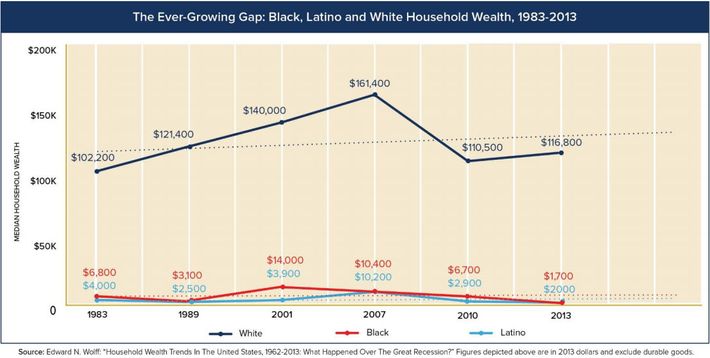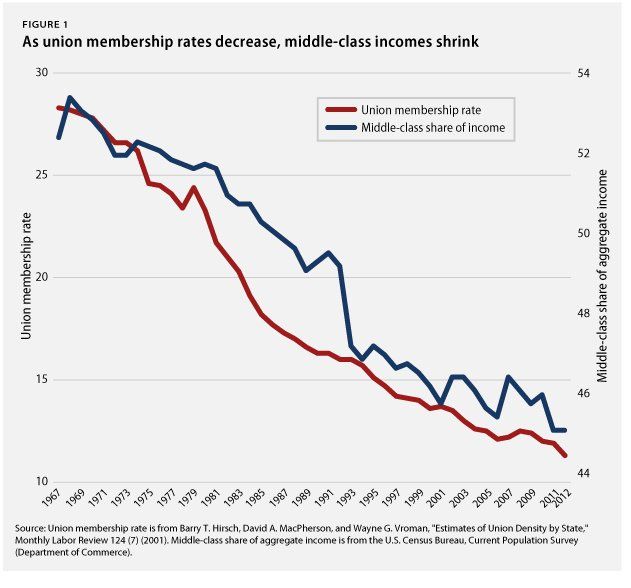
A half-century ago today, a bullet robbed Martin Luther King Jr. of his life and America of his leadership. Anniversaries like this inevitably inspire reflection on how our country’s contemporary reality measures up to King’s dream. A few years ago, the tenor of such societal self-evaluations was radically different. Serious thinkers could herald the dawn of a “post-racial America” without having their words drowned out by incredulous laughter. But while Barack Obama’s election gave fleeting validation to that fantasy, his presidency thoroughly discredited it. The apocalyptic tantrum that the right sustained through every minute of the first black president’s tenure made it clear that America’s white-supremacist past was neither dead, nor past. And the “discovery” of routine, unpunished police violence against African-Americans; the racial wealth gap’s accelerating growth; the resilience of residential segregation; and, of course, the election of Donald Trump, all testified to the myopia of mistaking the election of a black man for the liberation of black people.
Today, few argue that we, as a society, have reached King’s promised land, or have even gotten within its vicinity. Rather, debate now focuses on whether the events of the past 50 years give us cause to believe we will ever realize the reverend’s dream — or else, to think that the arc of history bends in no given direction (save ecological ruin).
This dispute often focuses on competing definitions of progress — but really boils down to how one defines King’s “dream.” It is hard to argue that we have made no progress toward realizing the reverend’s most famous and widely endorsed aspiration — that his four children would “one day live in a nation where they will not be judged by the color of their skin but by the content of their character.” The idea that one cannot judge the worthiness of an individual by the color of her skin is unquestionably more hegemonic in today’s United States, than it was in that of 1968. The year that King died, roughly 53 percent of white Americans expressed support for laws against interracial marriage; today, 89 percent of whites oppose such prohibitions, according to a recent survey from the National Opinion Research Center. Meanwhile, the share of nonblacks in the U.S. who say they would object to a relative marrying an African-American has fallen from 63 percent in 1990 to 14 percent in 2016.

Similarly, the share of white Americans willing to tell a pollster that they would move if an African-American family joined their neighborhood has plummeted from nearly 50 percent in King’s day, to 6 in the most recent World Values Survey.
The exile of overt white-supremacist sentiment to the margins of American society is no insignificant achievement (a reality that many progressives have come to appreciate as such sentiment has begun creeping back toward the American mainstream over the past two years). The retreat of that rancid ideology — formally declared through the passage of anti-discrimination laws — cleared the way for African-Americans to make profound material and cultural gains. Since 1968, black Americans’ life expectancy has increased by 11.5 years, their infant mortality rate has fallen by roughly two-thirds, while their likelihood of attaining a college diploma has more than doubled, according to a recent report from the Economic Policy Institute. While these developments are the result of myriad factors, the end of de jure discrimination in public education, employment, and accommodations was surely a critical one.
None of this is to suggest that anti-black prejudice does not still play a central role in American life. Racial discrimination in housing, hiring, criminal sentencing, and even access to the ballot all remain pervasive. We have by no means realized King’s most-celebrated ambition. But it is difficult to dispute that contemporary America is much closer to being a race-blind meritocracy in 2018 than it was a half-century ago.
Whether we have made any progress toward realizing King’s more radical dream — the one he was chasing at the time of his death — is far less clear. In 1968, King was not dreaming of an America that would judge the worthiness of its people on the basis of their individual character, regardless of their skin color; rather, he was dreaming of one that would judge all its people as being worthy of guaranteed health care, housing, employment, and/or an unconditional, living income, regardless of their character. And King understood that the realization of the former ambition in no way guaranteed the subsequent triumph of the latter one.
“We must see that the struggle today is much more difficult,” King said in “The Other America,” the sermon he spent much of the last two years of his life preaching. “It’s more difficult today because we are struggling now for genuine equality. It’s much easier to integrate a lunch counter than it is to guarantee a livable income and a good solid job. It’s much easier to guarantee the right to vote than it is to guarantee the right to live in sanitary, decent housing conditions. It is much easier to integrate a public park than it is to make genuine, quality, integrated education a reality.”
There is a reason that few Americans remember this as King’s definition of genuine equality: Even as his condemnation of racial discrimination has become vastly more accepted over the past five decades, his call for radical economic democracy has become less so.
In 1968, the Democratic Party was unequivocally committed to the notion that the federal government had a responsibility to eradicate poverty through interventions in the market economy. The following year, a Republican president gave serious consideration to establishing an unconditional, basic income for all poor families in the United States — one equal to roughly $10,000 in today’s money. Shortly after that, a bipartisan bill that would have established something close to universal child care in the United States passed Congress with lopsided margins (only to be vetoed by a previously supportive Richard Nixon). All of which is to say: At the time of King’s death there was a broad, bipartisan consensus that the American state had a responsibility to guarantee all of its citizens certain fundamental goods and services — and the list of what qualified as such a fundamental good or service was gradually expanding.
Three decades later, a Democratic president would announce that “the era of big government” was over — and that impoverished American families were no longer entitled to unconditional cash assistance. Meanwhile, the Republican leadership wouldn’t just lose its openness to expanding the welfare state, but come to reject its very legitimacy. And now, our government has fallen into the hands of the most rabidly reactionary coalition in modern American history — one that spent most of last year trying to slash federal health-care spending in the middle of a “public health emergency” that is disproportionately afflicting its own constituents. The modern Republican Party does not merely reject the notion that the federal government has a responsibility to abolish poverty — it acts as though it believes the American state has an obligation to make it easier for employers to steal their workers’ wages; polluters to poison communities; and the richest people in our country, to extract an ever-greater slice of wealth from the general population.
Just as the retreat of white-supremacist ideology had profound material consequences for African-Americans, so too did the erosion of the New Deal consensus. As cash assistance to the non-working poor was reduced, the rate of “deep poverty” in the United States — defined as the condition of having an income below 50 percent of the federal poverty level — rose from 3.7 percent in 1975 to 5.8 percent in 2016, with African-Americans making up a disproportionate share of that impoverished population. Disinvestment from affordable housing combined with the skyrocketing price of real estate in many urban centers increased the share of extremely impoverished families who spend more than half of their monthly income on rent, from 44 percent in 1978, to 65 percent in 2015.
Most critically, the rightward shift in America’s prevailing economic ideology — and the consequent decimation of unions, decline in labor’s share of productivity gains, and availability of working-class jobs that provide a living wage and comprehensive benefits — deprived countless African-American families of the opportunity to build wealth. According to the Institute for Policy Studies (ISP), the wealth of the median black household fell by 75 percent between 1983 and 2013 (from $6,800 to $1,700), even as the median white household grew by 14 percent richer (from $102,200 to $116,800). In ISP’s analysis, the median black household is on pace to own 18 percent less in 2020 than it did in 2013 — at which point, it will own 86 times less than its white counterpart.

It is difficult to overstate the centrality of this wealth gap to modern America’s other racial inequities. Mass incarceration disproportionately victimizes African-Americans — but it even more disproportionately victimizes poor African-Americans (in fact, black Americans at the top of the income distribution are far less likely to ever suffer incarceration than are whites at the bottom). Meanwhile, the resilience of residential and educational segregation in the U.S. is both a cause and product of the wealth gap; where black families were once formally barred from predominantly white neighborhoods and schools by de jure segregation, many are now effectively prevented from accessing them by real-estate prices.
The fact that white Americans have become less overtly racist over the past four decades — even as the nation’s distribution of wealth has become more racially unequal, and its dominant governing ideology less amenable to King’s conception of “genuine equality” — points to the severe limitations of the reverend’s most-celebrated dream. The stigmatization of racial prejudice in our culture, and prohibition of racial discrimination in our society, are both necessary for black liberation — but they are not sufficient for it.
There is great value in persuading light-skinned people that race is a mendacious fiction, while white privilege is an indisputable fact. But it is entirely possible for a person to accept these truths, while nevertheless perpetuating racial inequality. The good white liberal who meticulously reminds herself of her privilege — while sending her child to a private school, or recoiling at the integration of socioeconomically disadvantaged children into her public one — is a cliché with considerable basis in reality. One can attribute this phenomenon to the insincerity of many a “good” liberal’s belief in racial equality. But one could also see it as a parent’s rational, if lamentable, response to a world in which her offspring’s access to dignified labor and material security is contingent on their academic performance as adolescents.
During his final years on Earth, King evinced some sympathy for the latter view. In the introduction to the “Freedom Budget for All Americans” — the blueprint for economic change that King promoted during his Poor People’s Campaign — A. Philip Randolph lamented the tragic reality that “groups only one generation removed from poverty themselves, haunted by the memory of scarcity and fearful of slipping back, step on the fingers of those struggling up the ladder.” The upshot of this observation — that achieving economic security for the people at the bottom of America’s economic and racial hierarchies would require guaranteeing such security to those above them — was among the Freedom Budget’s animating convictions.
In pockets of the contemporary left, there is an allergy to such universalism; or, more precisely, to the idea that prioritizing universalist economic reforms is the most effective means of advancing racial justice. In his own foreword to the Freedom Budget, however, King was unequivocal in his insistence that only universalist, class-conscious political rhetoric and policymaking could liberate the black underclass (of a majority-white democracy):
The long journey ahead requires that we emphasize the needs of all America’s poor, for there is no way merely to find work, or adequate housing, or quality-integrated schools for Negroes alone. We shall eliminate slums for Negroes when we destroy ghettos and build new cities for all. We shall eliminate unemployment for Negroes when we demand full and fair employment for all. We shall produce an educated and skilled Negro mass when we achieve a twentieth century educational system for all.
The past five decades have done little to discredit this assessment. As we’ve seen, since 1968, Americans have become more racially enlightened, and African-Americans have significantly increased their representation among our nation’s political, cultural, and intellectual elite. Meanwhile, the American working class has become far less politically organized and economically powerful — and there’s a reasonable case that the former has done less to advance the prospects of King’s most radical ambitions than the latter has to frustrate them.
When America’s unionization rate was above 25 percent, a Republican president gave serious consideration to guaranteeing at least $10,000 (in today’s currency) in unconditional, annual income to every black family in America; in 2017, as that rate sat just above 10 percent, our Republican president made trying to deny 20 million Americans access to basic health care his top legislative priority.

Without question, there are a lot of other variables that contributed to our nation’s retreat from King’s vision of genuine equality — including the racist backlash to the civil-rights breakthroughs of the 1960s, which chased much of the South (and considerable portions of the North) from the New Deal coalition.
But the core convictions that informed King’s work in the final years of his life — that civil “equality” would have little substance for much of America’s black population absent radical changes to nation’s political economy, and that such changes would be impossible to bring about, absent the mass mobilization of a cross-racial coalition of the economically disadvantaged — ring as true today as they did five decades ago.
If we are to make progress toward realizing King’s most liberatory dream in the next half-century, we’d do well to heed such truths. Fortunately, a few of us already are.






























